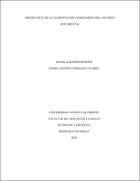Please use this identifier to cite or link to this item:
https://repositorio.uco.edu.co/jspui/handle/20.500.13064/645Full metadata record
| DC Field | Value | Language |
|---|---|---|
| dc.rights.license | http://creativecommons.org/licenses/by/3.0/ | - |
| dc.contributor.author | Rendón-Rendón, Daniela | spa |
| dc.contributor.author | Corrales-Ocampo, Isabel Cristina | spa |
| dc.coverage.spatial | Sudamérica, Colombia, Rionegro, Antioquia | es_ES |
| dc.coverage.temporal | 2020 | es_ES |
| dc.date | 2020-07-31 | |
| dc.date.accessioned | 2020-10-09T19:05:55Z | |
| dc.date.available | 2020-10-09T19:05:55Z | |
| dc.date.issued | 2020-10-09 | |
| dc.identifier.uri | https://repositorio.uco.edu.co/handle/20.500.13064/645 | |
| dc.description.abstract | En los últimos años han aumentado las publicaciones referentes a la alimentación complementaria y sus diferentes formas de implementación en las cuales se destacan la “Alimentación Perceptiva” y el “Baby Led Weaning”, siendo estas las técnicas más recientes y debido a esto con una evidencia científica limitada que avale su uso; en torno a la alimentación complementaria cada día surgen nuevas recomendaciones o conceptos referentes sobre qué es lo más pertinente o adecuado al momento de introducir la alimentación complementaria, creando confusión y posiblemente malas prácticas por parte del personal de salud encargado de educar y orientar a las familias en este proceso vital para el niño. Según el manejo de la alimentación complementaria pueden presentarse diversos riesgos a corto o largo plazo en la salud del niño, además, repercusiones económicas en las familias y el sistema de salud, debido al aumento de la morbilidad a futuro, de manera puntual la relación con la prevalencia de enfermedades tales como sobrepeso y obesidad, diabetes mellitus tipo 2, e infecciones gastrointestinales, entre otras. Teniendo en cuenta lo mencionado anteriormente, resulta de gran importancia generar un documento en el cual el personal de salud pueda acceder a información clara, precisa, confiable y con respaldo científico, sobre la alimentación complementaria, todo esto con el fin de contribuir a condiciones que permitan el desarrollo del potencial genético de los niños. | es_ES |
| dc.format.extent | 77 | es_ES |
| dc.format.mimetype | application/pdf | es_ES |
| dc.language.iso | spa | es_ES |
| dc.relation | Trabajo de grado | es_ES |
| dc.rights | info:eu-repo/semantics/openAccess | spa |
| dc.rights.uri | http://creativecommons.org/licenses/by-nc-nd/2.5/co/ | * |
| dc.subject | Alimentación Complementaria | es_ES |
| dc.subject | Alimentación Del Niño | es_ES |
| dc.subject | Crecimiento Y Desarrollo | es_ES |
| dc.title | Importancia de la alimentación complementaria: Revisión documental | es_ES |
| dc.type | Review article | es_ES |
| dc.description.abstractenglish | In recent years the publications referring to complementary feeding and its different forms of implementation have increased in which “Perceptual Feeding” and “Baby Led Weaning” stand out, these being the most recent techniques and due to this with evidence limited scientific support for its use; Regarding complementary feeding, every day new recommendations or concepts regarding what is most pertinent or appropriate when introducing complementary feeding arise, creating confusion and possibly bad practices on the part of health personnel in charge of educating and guiding families in this vital process for the child. Depending on the management of complementary feeding, there may be various short or long-term risks to the health of the child, in addition, economic repercussions on families and the health system, due to increased morbidity in the future, in a specific way the relationship with the prevalence of diseases such as overweight and obesity, type 2 diabetes mellitus, and gastrointestinal infections, among others. Taking into account the aforementioned, it is of great importance to generate a document in which health personnel can access clear, precise, reliable and scientifically supported information on complementary feeding, all this in order to contribute to conditions that allow the development of the genetic potential of children | es_ES |
| dc.subject.subjectenglish | Supplementary Feeding | es_ES |
| dc.subject.subjectenglish | Child Feeding | es_ES |
| dc.subject.subjectenglish | Growth And Development | es_ES |
| dc.subject.lemb | Niños- Nutrición | es_ES |
| dc.subject.lemb | Hábitos alimenticios | es_ES |
| dc.subject.lemb | Nutrición | es_ES |
| dc.subject.lemb | Salud | es_ES |
| dc.subject.lemb | Orientación nutricional | es_ES |
| dc.audience | Interés General | spa |
| dc.rights.accessrights | Open Access | spa |
| dc.rights.spa | Acceso abierto | spa |
| dc.rights.cc | Atribución-NoComercial-SinDerivadas 2.5 Colombia | * |
| dc.publisher.department | Ciencias de la salud | es_ES |
| dc.publisher.program | Nutrición y Dietética | es_ES |
| dc.contributor.corpauthor | Universidad Católica de Oriente. Facultad de ciencias de la salud | es_ES |
| dc.identifier.bibliographicCitation | Rendón Rendón, Daniela; Corrales Ocampo, Isabel Cristina. Importancia De La Alimentación Complementaria: Revisión Documental(Trabajo de grado) Rionegro, Antioquia: Universidad Católica de Oriente; 2020. 77p. | es_ES |
| Appears in Collections: | Nutrición y dietética | |
Files in This Item:
| File | Description | Size | Format | |
|---|---|---|---|---|
| autorización.pdf Until 2050-12-30 | 478.84 kB | Adobe PDF | View/Open Request a copy | |
| TRABAJO DE GRADO ALIMENTACIÓN COMPLEMENTARIA REVISIÓN DOCUMENTAL.pdf | 841.09 kB | Adobe PDF |  View/Open |
This item is licensed under a Creative Commons License

